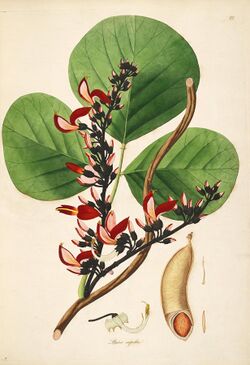Biology:Butea superba
| Butea superba | |
|---|---|

| |
| Scientific classification | |
| Kingdom: | Plantae |
| Clade: | Tracheophytes |
| Clade: | Angiosperms |
| Clade: | Eudicots |
| Clade: | Rosids |
| Order: | Fabales |
| Family: | Fabaceae |
| Subfamily: | Faboideae |
| Genus: | Butea |
| Species: | B. superba
|
| Binomial name | |
| Butea superba Roxb.
| |
Butea superba is a vining shrub in the legume family Fabaceae, native to India and mainland Southeast Asia. It is thought by locals to be an aphrodisiac, among other effects.
Efficacy
Existing open trials have come to conflicting conclusions about the efficacy of butea, though they used completely different products at different doses and in different populations.[1] No placebo-controlled clinical studies exist so far to support aphrodisiac activity.
Actions
The tuberous roots of Butea superba were found to contain flavonoids and flavonoid glycosides as well as sterol compounds, including β-sitosterol, campesterol and stigmasterol.[2]
Safety
One study in rats found the application of high doses of dried plant material (200 mg/kg body weight) had a negative impact on several blood parameters and decreased testosterone.[3]
See also
- Pueraria mirifica (white kwao krua)
References
- ↑ Yarnell, Eric (2016). Natural Approach to Urology and Men's Health (2nd ed.). Wenatchee, WA: Wild Brilliance Press. ISBN 978-1-933350-69-1. http://wildbrilliancepress.com/category/textbooks.
- ↑ "Flavonoid and flavonoid glycoside from Butea superba Roxb. and their cAMP phosphodiesterase inhibitory activity". J Sci Res Chula Univ 25: 169–76. 2000.
- ↑ "Androgen disruption and toxicity tests of Butea superba Roxb., a traditional herb used for treatment of erectile dysfunction, in male rats". Maturitas 60 (2): 131–7. June 2008. doi:10.1016/j.maturitas.2008.04.011. PMID 18554827.
Wikidata ☰ Q1759047 entry
 |


